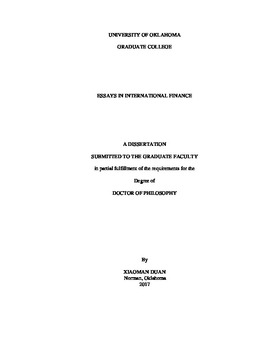| dc.description.abstract | This dissertation is a collection of three essays on the theme of international finance. Chapter 1 compares the takeover premia paid by government-owned and private sector bidders in the oil and gas industry. Using the Schwert (1996) measure for acquisition premium, I find that public shareholders on average receive a 46% lower premium when the bidder is a government-owned firm than when it is a private sector company. However, the premium difference disappears once I control for deal and target characteristics, and this finding is robust to the concern that government bidders do not invest randomly. I further compare changes in target characteristics after the acquisitions and find no significant differences between the targets acquired by government-owned and private sector firms. These findings suggest that both government and private sector bidders are motivated by commercial objectives when they are investing in the oil and gas industry.
Chapter 2 examines the role of economic policy uncertainty in capital structure adjustments. After accounting for macroeconomic conditions, firm and industry characteristics, I find that firms wait longer to issue debt and reduce leverage during periods of high economic policy uncertainty. Furthermore, debt maturity shortens and borrowing costs increase when uncertainty elevates. The effect of economic policy uncertainty is moderated by supply-side factors such as having access to public debt markets and having an investment grade bond rating. The results are robust to endogeneity concerns, alternative model specifications, testing strategies, and subsample analyses, as well as alternative measures of economic policy uncertainty. Collectively, the evidence suggests that the supply of capital plays an important role in corporate capital structure choices in times of high economic policy uncertainty.
Chapter 3 studies the degree and determinants of capital allocation efficiency across firms using comprehensive firm-level survey data that covers a wide spectrum of developing countries. I document that capital misallocation, as measured by the dispersion in firms’ marginal revenue product of capital, is pervasive in firms within the same industry in a country. I find that limited access to finance, bureaucracy, information asymmetry, and gender inequality play important roles in impeding the most efficient allocation of capital across firms in developing countries. By employing the quantile regression technique, I show that these factors exert greater effects on firms that are already highly distorted (i.e., have too little capital). The results have direct policy implications; in particular, governments could achieve a more efficient allocation of capital by eliminating these distortions to enhance economic performance. | en_US |
